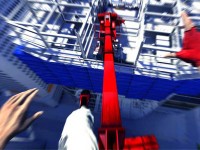There are many things that have been said about Mirror’s Edge, both good and bad. It’s a game that has polarised many gamers. But it must be noted that it tried to bring something new to the table, with its focus on movement, environment and traversal. And in doing so, it elicits an emotion that is so often neglected in many games: Exhilaration.
This fundamental shift in thinking about what constitutes a first person game was revolutionary. It separated itself from the many games that we uphold as the highest standards of the genre, which focused primarily on combat and shooting.
 When we see a game like Call of Duty 4, we must acknowledge that its an evolutionary product, and not a revolutionary one. It was built around the very same core focus of many other FPS games before it. Level design centered around making combat fun, intuitive and challenging. Sound design focused on giving gamers a real sense of handling a deadly and hefty weapon.
When we see a game like Call of Duty 4, we must acknowledge that its an evolutionary product, and not a revolutionary one. It was built around the very same core focus of many other FPS games before it. Level design centered around making combat fun, intuitive and challenging. Sound design focused on giving gamers a real sense of handling a deadly and hefty weapon.
As such, movement was never given the same primacy in these games. Movement was never intended for gamers to fully experience the environment. It was designed so that players could get from one vantage point to another. And its purpose was supplement combat, and not to hamper or obstruct that combat experience. It was a means towards an end.
Mirror’s Edge attempted to flip that entire concept on its head, by focusing entirely on the movement, and bringing it to the forefront as never before. It was no longer merely the means towards some other end; the entire purpose of the game was to run.
Removing weapons from the equation was an alien concept. For stalwarts of the first person genre, it might have even felt dis-empowering. Until gamers realise that empowerment does not necessarily need to always come in the shape of a gun. Running does not automatically equate to running away. And running away does not automatically equate to losing or failing.
 Players don’t just simply run, jump and crouch. They can also vault, slide, roll, swing, scale and run along walls. There is such a wide vocabulary of movement options to choose and utilise. And each one is a viable tool in players’ arsenal. ME’s level design takes full advantage of that, by letting players experience and experiment with any combination of moves. Instead of getting 10 different guns to choose from to shoot an enemy, players get 10 different move sets to approach that enemy and kick him in the head.
Players don’t just simply run, jump and crouch. They can also vault, slide, roll, swing, scale and run along walls. There is such a wide vocabulary of movement options to choose and utilise. And each one is a viable tool in players’ arsenal. ME’s level design takes full advantage of that, by letting players experience and experiment with any combination of moves. Instead of getting 10 different guns to choose from to shoot an enemy, players get 10 different move sets to approach that enemy and kick him in the head.
Simply increasing the number of movement options doesn’t mean anything if players aren’t able to take advantage, and maximise its full potential. The environments in ME immediately give players ample visual information. Players can see where the ledge of a building ends, and where things can be climbed or scaled. They understand the meaning and consequence of height, speed, and momentum. Most importantly, they understand how far a drop it is to the bottom.
And it is this understanding of consequence that is key to the game. The potent combination of understanding this consequence, coupled with possessing the necessary tools to succeed enables ME to elicit that sense of exhilaration. Players possess an innate understanding what it means to fall, and seek the assurance across on the other side. The other side represents safety and success, and it lies so tantalisingly close. Players know that if they did everything just right, that they’d be able to make the jump.
 There is a moment of doubt though. That moment, as they leap off the edge of the building, and lose control for a split second as they sail through the air. And in that moment, without any control, success and failure becomes an unknowable quotient. It is being on that very edge, between assurance and downfall, that gives ME that undeniable thrill.
There is a moment of doubt though. That moment, as they leap off the edge of the building, and lose control for a split second as they sail through the air. And in that moment, without any control, success and failure becomes an unknowable quotient. It is being on that very edge, between assurance and downfall, that gives ME that undeniable thrill.
Through it’s unique perspective of game mechanics, ME brought back into gaming a sensation that is not commonly experienced: the feeling of exhilaration. There are games that trigger many different emotional responses: fear, excitement, tension. But few give gamers the same sense of being on the edge, and losing control.








